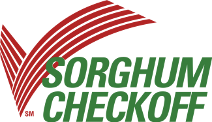 The Sorghum Checkoff, Kansas Grain Sorghum Commission and Kansas State University (KSU) have entered into a cooperative agreement to increase grain sorghum productivity and expand markets by 2025.
The Sorghum Checkoff, Kansas Grain Sorghum Commission and Kansas State University (KSU) have entered into a cooperative agreement to increase grain sorghum productivity and expand markets by 2025.
Coordinated efforts for the Collaborative Sorghum Investment Program will begin April 1st, 2016, and operate through the Center for Sorghum Improvement at KSU. Results will impact sorghum producers throughout the country.
“After more than a year of planning and orchestrating, the Collaborative Sorghum Investment Program is now a reality,” said Florentino Lopez, Sorghum Checkoff executive director. “This program will serve as a platform aimed at reaching the Sorghum Checkoff’s mission of investing checkoff dollars to increase producer profitability and enhance the sorghum industry. This program helps by aligning many resources to meet the needs of sorghum farmers throughout the U.S.”
The program aims to increase the average national yield from 61.95 bushels per acre to 100 bushels per acre by 2025 by funding research in over-the-top grass control, breeding program developments, and field-level management techniques. Long-term research areas such as seed innovation and information management will also be addressed.
The program will also work to develop marketplaces, attributes, qualities and other factors capable of increasing demand to 1.25 million bushels of sorghum by 2025, including the expansion of international markets, domestic food use, livestock feeding, ethanol production, and specialty products.
“This agreement will provide a valuable investment in long-term sorghum research,” said Stephen Bigge, Kansas Grain Sorghum Commission chairman. “Sorghum producers will benefit from the advancement of sorghum technology for many years to come.”
The Kansas Grain Sorghum Commission and the Sorghum Checkoff have each contributed a $2 million investment to this project, and KSU has contributed an $800,000 investment, bringing total support for the program to $4.8 million.
“We look forward to implementing this agreement to the benefit of the entire sorghum industry,” said John Floros, KSU Dean of the College of Agriculture and director of K-State Research and Extension. “We are pleased to leverage our resources with this new program.”
